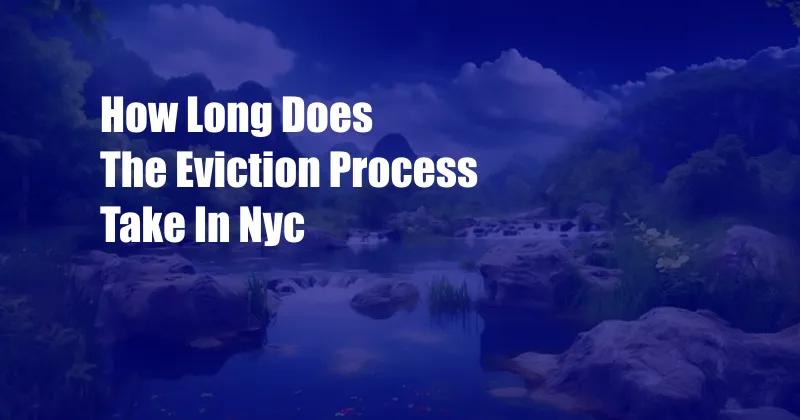
How Long Does the Eviction Process Take in NYC?
Being evicted from your home is a stressful and traumatic experience. If you’re facing eviction in New York City, it’s crucial to understand the legal process and your rights as a tenant. In this comprehensive guide, we’ll delve into the eviction timeline in NYC, providing you with a detailed overview of what to expect and how to navigate this challenging situation.
Understanding the Eviction Process
The eviction process begins when your landlord serves you with an eviction notice. This notice will provide the reason for the eviction and the date you have to vacate the premises. You have a limited amount of time to respond to the notice, usually 30 days, before the court can issue an eviction order.
Preparing for the Eviction Process
If you receive an eviction notice, it’s crucial to take immediate action. Contact a legal aid organization or attorney who specializes in housing law. They can help you understand your rights and guide you through the eviction process. Gather all relevant documentation, such as your lease agreement, rent receipts, and any communication you’ve had with your landlord.
The Eviction Timeline in NYC
The eviction timeline in NYC varies depending on the reason for the eviction and the specific circumstances of your case. Here’s a general overview of the process:
- Notice of Eviction: You receive a legal notice informing you of the reason for the eviction and the date you have to vacate.
- Response to Notice: You have a limited time (usually 30 days) to respond to the notice by paying the rent, fixing the violation, or appearing in court to contest the eviction.
- Court Hearing: If you contest the eviction, you’ll have a hearing in housing court. The judge will review the evidence and make a decision.
- Eviction Order: If the court rules in favor of the landlord, an eviction order will be issued. This order gives the landlord the legal authority to remove you from the property.
- Execution of Eviction: The landlord must request a warrant from the sheriff to execute the eviction order. The sheriff will then schedule a time to remove you from the property.
Latest Trends and Developments in the NYC Eviction Process
The NYC eviction process is constantly evolving. Recent changes and developments include:
- Tenant Protection Laws: New laws have been enacted in NYC to provide tenants with additional protections, such as extending the notice period and limiting the reasons for eviction.
- Online Eviction Notices: Landlords can now serve eviction notices electronically, making the process more efficient and accessible.
- Eviction Prevention Programs: The city has implemented programs to help tenants avoid eviction, such as rental assistance and legal counseling.
Tips and Expert Advice for Navigating the Eviction Process
If you’re facing eviction, here are some tips and expert advice to help you:
- Act Quickly: Don’t ignore the eviction notice. Contact a legal aid organization or attorney immediately to start preparing your response.
- Gather Evidence: Collect all relevant documentation, including your lease agreement, rent receipts, and any communication you’ve had with your landlord.
- Explore Legal Defenses: You may have legal defenses against the eviction, such as landlord harassment, retaliation, or a violation of your lease agreement.
- Seek Financial Assistance: If you’re struggling financially, explore rental assistance programs or negotiate a payment plan with your landlord.
Remember, you have rights as a tenant. Don’t give up without a fight. Seek legal help, gather evidence, and explore all your options. With the right support and guidance, you can navigate the eviction process and protect your housing.
FAQs on the Eviction Process in NYC
1. How long does it take to be evicted in NYC?
A: The eviction process can take several months, depending on the reason for the eviction and the specific circumstances of your case.
2. What are the most common reasons for eviction in NYC?
A: The most common reasons for eviction in NYC are nonpayment of rent, lease violations, and nuisance behavior.
3. Can I be evicted if I have a disability?
A: No, it is illegal to evict a tenant because of a disability. Landlords are required to make reasonable accommodations for tenants with disabilities.
4. What happens if I am evicted?
A: If you are evicted, you will be legally required to vacate the property. The landlord can change the locks and remove your belongings.
5. Where can I get help with the eviction process?
A: You can get help with the eviction process by contacting a legal aid organization, such as the Legal Aid Society or the Coalition for the Homeless.
Conclusion
Facing eviction is a daunting experience, but understanding the process and your rights can empower you to navigate this challenging situation. By following the steps outlined in this article and seeking professional help when needed, you can protect your housing and ensure a fair outcome.
If you have any questions or concerns about the eviction process in NYC, don’t hesitate to reach out to a legal aid organization or attorney for guidance. Remember, you are not alone in this, and there are resources available to assist you.